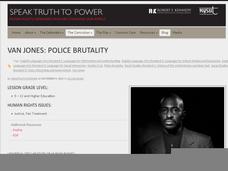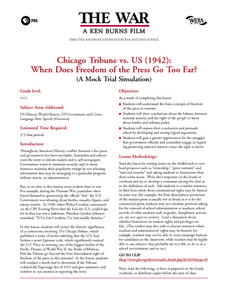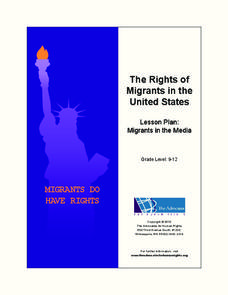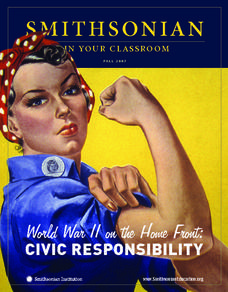Curated OER
The Bill of Rights
In groups, learners review one of four selected Supreme Court cases. The whole class watches a video introducing the four cases, and then small groups dive into Internet research in an attempt to write a two-paragraph summary of the...
Robert F. Kennedy Center for Justice and Human Rights
Van Jones: Police Brutality
Develop an understanding of how the media and society are connected and responsible for the defense of universal human rights. Learners investigate and examine the conflicts of police brutality as it is portrayed in the media and through...
Curated OER
Women and World War II
Learners determine the influence of World War II on women's roles in society. Students research the answers to questions about how women were able to enter jobs that had not been open to them before the war and how this affected society....
Curated OER
Comparison of Colonial Regions in British North America
Students compare and contrast the colonies in British North America. As a class, they brainstorm a list of people, places and ideas associated with the Colonial Era. They discover the relationships and interactions between the...
Curated OER
World War Ii - Japanese American Internment
Ninth graders determine that nationality is not defined by race, especially in the United States. They group into teacher created dyads with eight pictures. Four pictures are of American citizens (multiracial representations), and...
Curated OER
Cultures Around the World
Students research, using the Internet, cultures of the world. They identify countries, their currency, holidays, climate and societal information. They look at the distance of international cities from their hometown.
Curated OER
Chicago Tribune vs. US (1942): When Does Freedom of the Press Go Too Far?
Students define freedom of the press in peace and war time. As a class, they identify the need for the public to be informed, but discuss where the line should be drawn to protect national security. They develop their arguments and...
Advocates for Human Rights
Migrants in the Media
Class members examine two documents—The Universal Declaration of Human Rights and The Rights of Migrants in the United States—and then use reports in the media to assess how well the US is doing in ensuring these rights.
Curated OER
World War II on the Home Front: Civic Responsibility
Students explore World War II. In this World War II instructional activity, students discover how volunteerism demonstrates civic responsibility. The instructional activity uses World War II-era posters to appeal to the learners and...
James Madison Memorial Fellowship Foundation
Those "Other Rights:" The Constitution and Slavery
Did the United States Constitution uphold the institution of slavery, or did it help to destroy it? Young historians study Article 4, Section 2, Clause 3 of the Constitution and evaluate the rights of slaveowners as they compared to or...
Curated OER
Immigration Debate
Students examine statements made by immigrants about immigration. They use the internet to research the truthfulness of these statements. They practice their decision-making skills.
Curated OER
The Japanese Military Build-up
Students evaluate the state of Japan's military and their defense strategy under the current Shinzo Abe administration. They watch the film, 'The Raping of Nanking' and read "The Return of Japanese Militarism: Rising Sun" by Joshua...
Curated OER
Readers Theatre: Presenting Historical Events Through Theatre
Students examine historical events. In this lesson on the US Constitution, students engage in a theatrical exploration of the Constitution and the Bill of Rights. They also engage in an extensive discussion, complete worksheets and draft...
Curated OER
Religion in Public Schools
Students examine the presence of religion in public institutions. In this ethics lesson, students focus on one aspect of the presence of religion in public institutions, and the controversy surrounding religion in the public schools....
Curated OER
Child Labor in Maryland: An Historical Investigation
Tenth graders, after reading two excerpts about contemporary child labor situations, discuss two broad questions in detail along with the industrial boom following the Civil War conditions in the United States. They investigate how the...
Foreign Policy Research Institute
Defining Democracy and Freedom
This is a simple but effective introduction to democracy. It requires the class to generate working definitions of key terms (provided) and to determine the degree of democracy in various geographic locations today. After they conduct...
Curated OER
The Persuaders
Have your upper graders watch the documentary, "The Persuaders" as they explore how advertisers try to gain potential customers. The video is followed by a discussion and close examination of new marketing trends and strategies.
Curated OER
On The Home Front
High schoolers write their responses to five questions about their home town. After watching an excerpt from "The War", they work together in groups to identify the characteristics of the four towns in the movie into a graphic...
Curated OER
"Declaration of Independence" From Plagiarism
So, what does the Declaration of Independence even mean? Learners of all ages paraphrase the Declaration of Independence in modern terms. They work as a group or class to paraphrase the language of the Declaration of Independence. There...
Constitutional Rights Foundation
Driver’s Licenses And Unauthorized Immigrants
Should driver's licenses be granted to unauthorized immigrants? That is the question class members grapple with in a lesson that asks them to first read a fact sheet that details the arguments for and against licensing unauthorized...
Curated OER
George Washington as Military Leader
Students will analyze historical evidence including primary sources to evaluate George Washington as a military leader. The reading begins with Washington's understanding of the issues related to military power, continues with his use of...
Curated OER
The Monroe Doctrine: Whose Doctrine Was It?
Was James Monroe the sole contributor of the Monroe Doctrine? Young scholars study the doctrine and cite evidence to show contributions of John Quincy Adams and Thomas Jefferson in its formulation.
Center for Civic Education
What Does Returning to Fundamental Principles Mean?
Looking for materials for your Constitution Day and Citizenship Day lessons? Then check out this packet of activities that not only gets your class members thinking critically about the fundamental principles at the heart of American...
Curated OER
What is Meant by Returning to Fundamental Principles?
What did the Founding Fathers mean by the importance of continually returning to fundamental principles? Your young historians will analyze a series of quotations illustrating the fundamental ideals and principles of the United States...

























